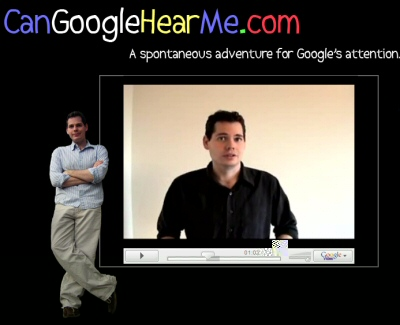
Aaron Stanton rose to online fame after vowing in a video that he'd fly to California and pitch an idea to Google. After they refused to let him camp in their lobby, he hovered nervously at a friend's house, recording anxious video updates at a web site — CanGoogleHearMe.com. On Valentine's Day, the story took a thrilling turn when he received a late-night email.
We can hear you : )
But what happened next? After his meeting with Google, 25-year-old Aaron returned mysteriously to his home in Boise and started rounding up programmers.
"It's related to the idea that I originally took down to Google," he told 10 Zen Monkeys. Does that mean Google rejected him? "That's a very premature assumption."
More About Aaron/Google
"I am very pleased with the outcome of the trip, and it falls very much in line with one of the hoped for outcomes before I started."
And when he returns, it doesn't look like he'll be waiting for a late-night invite again. "The return has fewer question marks about it than the original quest did," Aaron tells us. "I'll be going knowing what to expect, this time." But when it comes to the most important question, he's still maintaining the mystery. Where do things stand with Google?
Sorry, I can't really talk about Google's reaction at all. : )
One thing he will talk about is what a great experience it's been. "Independently of the actual project, I've had so many interesting opportunities that have opened up as a result of the adventure..." he tells us. When you ask him what the best part was, he says without hesitation: "The people I've met..."
And his email now ends with a grateful signature line.
"Sometimes when you say, 'Hello, World,' the world says hello back."
Aaron is filming more video updates as he puts together his team. Inspired by the story of Steve Jobs and Steve Wozniak, he looked for programmers at a computer science club at Boise State University. Saying it went "Different than I expected," Aaron described the experience in another video. "They spent 1.5 hours teaching me how to play Magic: The Gathering." Calling it "a positive meeting," Aaron ultimately teamed up instead with Brandon Zehm, a self-taught programmer who'd sent him an email. In the video he introduces the new programmer, who he adds can also play keyboards and make his own chain mail.
"And then there were two," the video concludes.
Aaron won't say what his big idea is, but one Digg poster speculates it was tied to an old venture of Aaron's called the Novel Project
By analyzing published novels and breaking them down into detailed statistics, then graphing those statistics scene-by-scene, we allow authors to better understand their craft in a way never before possible. You already know to start your book with a high interest scene, but do you know what to do with the scenes after that?
Another Digg poster claimed that "I e-mailed him, and he sent back a note saying that it was related, but much more than that, that it had actually branched from that into separate projects."
In February Aaron himself joined the discussion, posting on another site. "The idea was actually developed (in a simple form) in 2003 and then grew and branched, but it didn't become an obvious match for Google for a while after that."
The mystery may be agonizing, but "The problem is that the Internet is a fast medium," Aaron writes, "and it's covering what can sometimes be a slow medium, which is life. Life sometimes takes time."
But even if it doesn't work out, Aaron has a reponse to people who ask: what if Google hadn't agreed to hear you out? The bright side, he said, would've been all the encouragement he received — which would give him the strength to keep trying again later. In fact, he's already collected all the encouraging emails into a keepsake book that he's titled "We Can Hear You :)"
The homemade cover identifies its author as "Aaron Stanton and 2000 friends."
See Also:
Google Stalker Reveals Secret Project
Should YouTube Hear Me?
Google is Trying To Get Into Your Pants
Lost "Horrors" Ending Found on YouTube
YouTube, the 20-Year-Old, and Date Unknown
I guess what is interesting here is that this guy’s approach to getting attention from Google (and 10zm readers) actually works. But it’s sickening at the same time. What has he really done to earn that attention? Personally, I’d rather just wait until whatever thing the coy boy is working on sees the light of day, instead of guessing what he’s up to.
-Erik
Well based on what the DIGG users found out I bet it has something to do with Google’s Book search tool: http://books.google.com/
My response to this silly story is a big so what? If the intention here is to communicate to people that giant corporations like Google will actually listen to people who have ideas that will make them money, who bloody-well cares? The only reason not to do so could only result from Google believing it has reached its quota of geniuses, rendering its precious time too invaluable to waste on average human beings. Oh, how gracious of them. Not doing this more often or providing easier access for people to do so could only serve to restrict Google’s growth. The company comes across to me here as some kind of impenetrable fortress that for whatever reason allowed one oh-so-privileged dork to squeeze through a crack in its wall. I’m happy for the guy but what’s all the hype about really? A company took the time to listen to someone share an idea that will end up making them more money. Wow. Stop the presses. Any business that isn’t open to pitches deserves to fail.